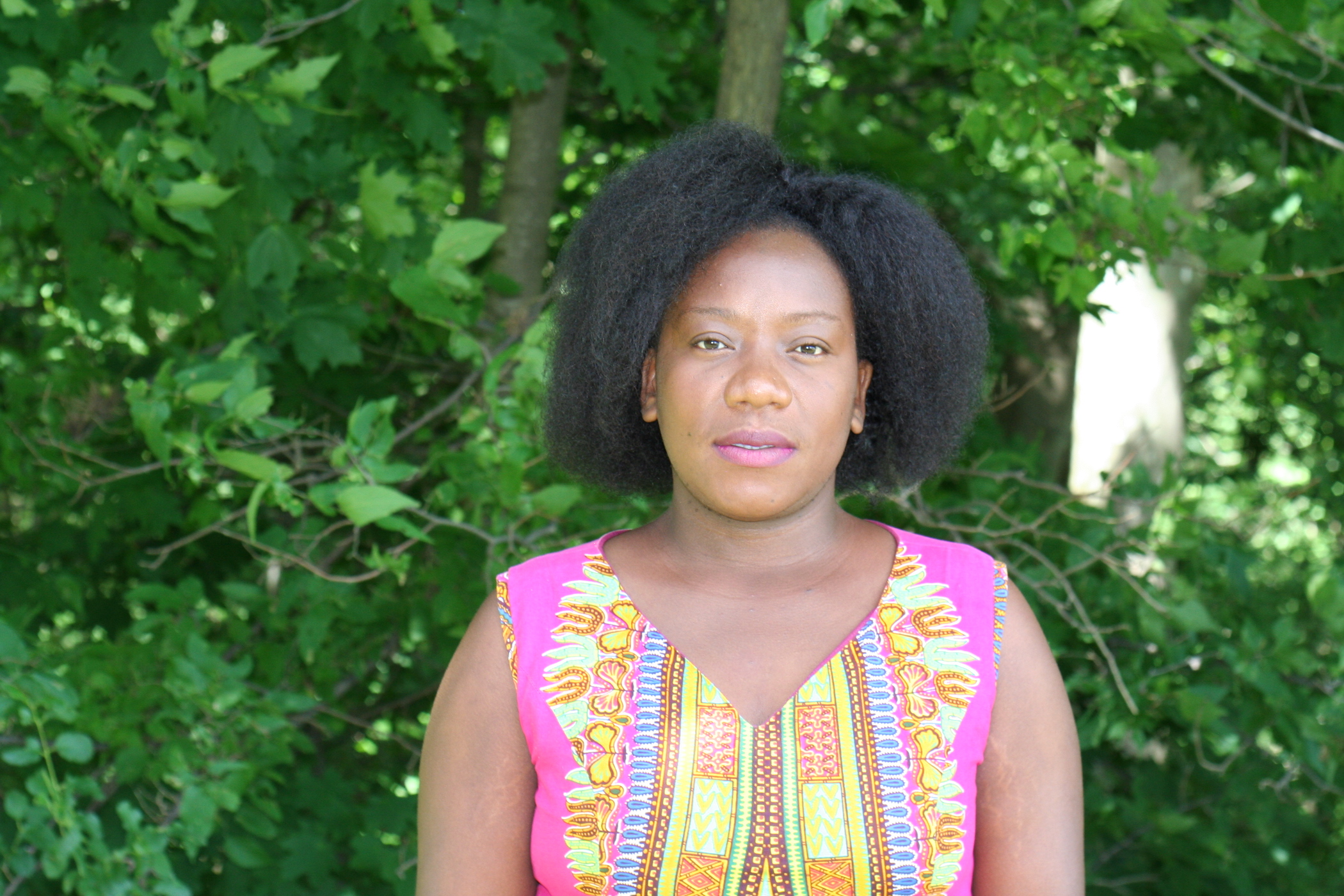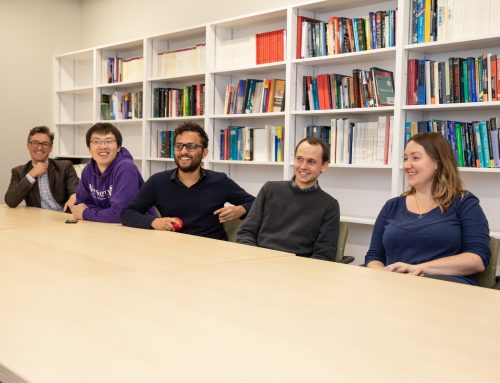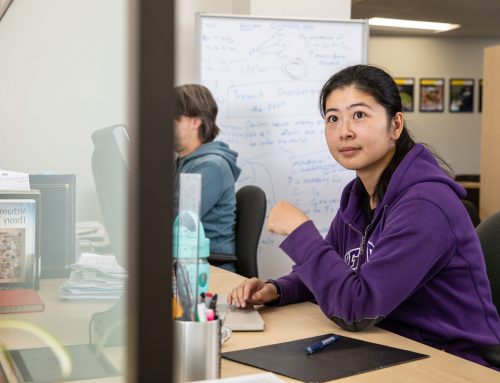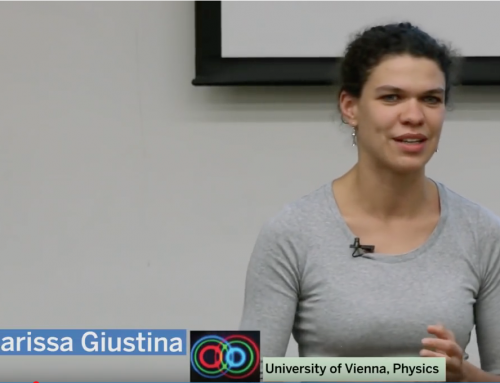by Deborah Fox
As a recipient of a Global Forum of Bioethics Research (GFBR) travel fellowship, Tiwonge Mtande has spent the month of June working here at the Rotman Institute in collaboration with Dr. Charles Weijer, and the ethics of pragmatic trials research team. Ms. Mtande is a Senior Research Officer at UNC Project-Malawi, and is currently working on a research study examining prevention of mother to child HIV transmission. During her visit, she agreed to sit down with me to briefly discuss her research interests, and what brought her here to the Institute.
DF: To start off, can you tell me about your background and how you first got interested in research ethics?
TM: I have a Bachelor of Science from University of Malawi. After completing my undergrad I joined UNC Project-Malawi. This is one of the biggest health research institutions in my country. For about two years I worked as an Institutional Review Board Officer–a position that involves being the research team’s liaison with research ethics committees and other regulatory bodies. I used to work with principal investigators on various studies to prepare protocol submissions for ethics review. In this position I was trained in Good Clinical Practice (GCP) to equip me with knowledge about ethics and regulatory issues in health research. If a trial, for instance vaccine or any drug trial, is conducted according to GCP, the results can be accepted anywhere. So having interacted with different principal investigators, I was convinced that research ethics is bigger than the GCP training that I had gone through. It was so clear that there is more to research ethics than the knowledge I had attained by that time. I developed an interest to learn more about it through short courses available on-line. Later, of course after so many years, I saw an advert that the Southern African Research Training Initiative (SARETI) was willing to support four students in Africa who were interested in pursuing a Master of Social Science with a focus on health research ethics at the University of kwaZulu-Natal in South Africa. I did not hesitate to apply, and I celebrated when I got selected. I have completed my course work, and am currently waiting for my thesis results. Since completing my SARETI training I have been working with a research team that is developing guidelines in order to safely and responsibly include pregnant women in research–it’s called the PHASES project. I am happy to pursue research ethics as my career.
DF: You’re currently here on a travel fellowship awarded to you by the GFBR. How did you first connect with Charles Weijer and his research ethics team?
TM: I participated in the Global Forum on Bioethics Research meeting, held in November 2017 in Thailand. It was my first time to attend this conference, and Charles was chairman of one of the panels that discussed ethics of cluster trials. One thing that I observed is that most of the cluster trial designs which were presented are common in implementation research–something that has recently received much attention in my country. Policymakers and researchers in Malawi are interested to see how study findings in clinical trials could be well implemented in routine settings. Mostly cluster randomized trial design, or stepped wedge design is used in these implementation research projects. Of all the various issues that were discussed at this conference, I was primarily interested in the ethics of cluster trials. During the conference I did not interact with Charles, but afterwards I did. The GFBR announcements came at the end of the conference where I saw Charles was listed as one of the hosts of the travel grants. I made a decision to apply for this opportunity to learn more about the ethics of cluster trials. I sent Chalres an email and that is how we connected, and he encouraged me and guided me on my fellowship application to GFBR.
DF: Now that you’ve been awarded the travel fellowship, how long will you be staying in London to work at the Rotman Institute?
TM: The travel grant is open for anywhere from 3 weeks to 3 months, but in my application I indicated 4 weeks only. This is because I could not be away for more than this duration due to my current commitments back home. I am employed and leading a clinical trial. It is a randomized controlled trial examining whether a couples-based approach or standard of care approach to Option B+ strategy is associated with improved maternal, paternal, and infant HIV outcomes. In this trial we will randomize 500 HIV infected women and their partners. It is a busy trial, and the country director and my principal investigators were very kind to allow me to be away for this fellowship, and I am so proud of them. Besides, I have a two year old child back home. It’s a huge sacrifice to stay away from such a toddler. I felt four weeks working with Charles would be reasonable.
DF: Can you tell me a bit about the work you’ve done with Charles, and what you’ve accomplished during your visit to the Institute?
TM: This mentorship program is going very well. I am grateful to Charles on the progress made so far. Indeed learning is taking place. And I am impressed with his approach to research ethics. I want to be just like him, as objective as possible to matters of research ethics. I have benefitted a lot from this mentorship.
We are reviewing ethical issues in a cluster randomized trial that was implemented by a consortium of eight organizations in Malawi. The trial was evaluating the effectiveness of peer-based education and psychosocial support on the uptake of and retention in the Option B+ program. The trial was conducted in 21 public health facilities, in 7 districts, from 2013 to 2016. Most of its publications have focused on methodology and study findings, so it is important to document the practical aspects of managing ethical issues in this CRT. We are using the Ottawa statement, which was published in 2012, to evaluate this trial. What we are finding is that the trial was well thought out and well done, but there are a few issues that may require further guidance. Moreover, the authors of the Ottawa statement acknowledged that there was an underrepresentation of low and middle income countries when they were developing the guidance document. I am hoping that the end product of this review will be published in peer reviewed journal. It’s going to be my first authored manuscript, and Charles will be the senior author. I am really looking forward to this!
DF: Can you tell me a bit more about what specific issues with cluster trials or aspects of research ethics interest you?
TM: I am still working on the manuscript so I don’t want to share too many details at this point. But one thing that is clear is that in CRTs the units of randomisation are intact social groups, such as schools, neighborhoods, medical practices or hospitals, as opposed to individual patients. But little has been written about ethical aspects of conducting CRTs in low and middle income countries. It will be nice to contribute to closing this gap. As an ambitious lady, I envision myself to be one of the leaders in the research ethics field, both local and international. Yeah, I am dreaming in color. All things are possible if you believe. And working with Charles and Cory has helped to enrich my knowledge base. I am looking forward to continuing to work with this team.
I am also interested in contributing to the effective operations of Malawian Research Ethics Committees (RECs). My master’s degree thesis is titled, “Ethical issues raised by a Malawian REC”. In this study I used the ethical framework that was developed by Emanuel and colleagues in 2004, discussing what makes clinical research ethical in developing countries. They developed eight principles and benchmarks to help RECs use when reviewing research protocols. So I was evaluating the concerns frequently raised by this REC, and I managed to rank them according to the principles in the framework. Once I get my thesis results, I will also write a manuscript about these study findings.
DF: So it sounds as if one of your long-term research goals is bridging the knowledge you gain from studying cluster trials to actual clinical implementation. Is that correct?
TM: I am pursuing the research ethics career with passion. In the near future I would like to pursue a PhD within the same field. I am searching and once I get the necessary support I will surely enroll. In my country there are very few people that have considered research ethics as a career. There are few of us in this field, but there are many areas that require attention to improve the research ethics oversight system and to provide guidance to researchers when conducting complex trials. In Malawi the disease burden is huge, and as such it has become a popular destination for international collaborative research.
DF: Do you plan to remain involved in the GFBR annual meetings, and to work with Charles in the future?
TM: Of course yes! GFBR holds annual meetings, which gives one an opportunity to get insights into ethical issues that are significant both locally and internationally. 2017 was the 12th annual meeting, and this year’s meeting will be held in Cape Town. I have applied for participation, and am keeping my fingers crossed. Like I have said earlier on, I want to work so hard to be like my mentor, I therefore look forward to continue working with Charles, as well as attending such important events.
DF: Thank you for taking the time to participate in this interview! Is there anything else you’d like to add?
I have enjoyed my four week stay here at Rotman Institute of Philosophy. It is a very friendly environment. It was nice working with everyone that I interacted with. I will miss you when I am back in Malawi. It was an experience I will live to cherish in my life. Thanks!






